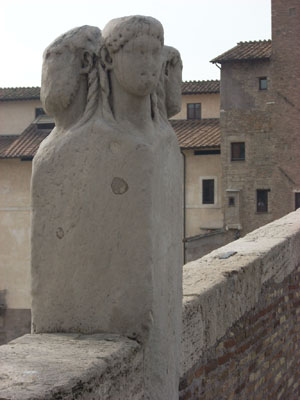 Are you ready for January 1? Maybe you want to spare a thought for what the ancients who named the first month, and made January 1 New Years Day, believed is going on at this time – and for who needs to be celebrated or propitiated at the turning of the year.
Are you ready for January 1? Maybe you want to spare a thought for what the ancients who named the first month, and made January 1 New Years Day, believed is going on at this time – and for who needs to be celebrated or propitiated at the turning of the year.
The Romans gave us the month of January – Januarius – and in that word we find the name of Janus, a mysterious god whose nature and energy are poorly understood, but may be highly relevant to our condition and our fortunes today. The best-known image of Janus is of a two-faced male. One face is turned towards the future, the other towards the past.
Janus is above all a Gatekeeper. He is the god of doors and gates in every sense – of the doors we find open or closed on our life roads, of the gates of time, of the portals between worlds. His name literally means “doorway” and may be derived from the older Etruscan word for door, jauna.
Janus was the first of the gods to be honored in the ceremonies of ancient Rome, just as elephant-headed Ganesh, the Gatekeeper of India, is honored first in Hindu rituals today. Highly appropriate, in both cases, since it is the Gatekeeper, by whatever name, who opens or closes the doors and the roads in our undertakings. The Gatekeeper is the god of beginnings.
The central importance of Janus in Roman religion is indicated by the pracrice at his temple in the Forum Romanum. In time of war, its gates – facing sunrise and sunset – were open. In time of peace, these gates were closed, For most of Roman history, the gates were open, signifying near-constant war.
Janus is also central to personal religion, the daily practice of families and individuals. His image was placed at the threshold of private homes, as guardian, marking the boundary between what happens within and without.
Janus is the patron and (by legend) the founder of Roman divination. He sees into both past and future and if we wish to see clearly, we invoke his blessing. The Romans did this with wine and honeycakes,with incense and respect. Ovid wrote in the Fasti:
“Why, Janus, when I placate other gods, do I bring incense and wine to you first?”
“So that you may gain entry to whatsoever gods you wish,” he replied, “through me, who guard the threshold.”
On the Ponte Fabricio in Rome is a weathered statue of Janus with no fewer than four heads. On the bridge – always a potent metaphor for the crossings of life – travelers would pause to touch the stone column for good luck. In this form, the simple image of Janus resembles the hermai, the votive pillars of Hermes (another form of the Gatekeeper) in ancient Greece.
So, in the midst of the New Years Eve festivities, spare a thought for the Gatekeeper, the lord of doors and thresholds and beginnings. He has many names in the world’s cultures. I salute him, in my own life and in the circles I lead, without personal names, content to ask:
May my doors and gates and paths be open
and the doors and gates and paths of those I love
and the doors and gates and paths between the worlds.
And may the doors and gates and paths
and the doors and gates and paths of those I love
and the doors and gates and paths between the worlds.
And may the doors and gates and paths
of any who wish to do me, or those I love, any harm
be closed.
be closed.
Four-headed Janus on the Ponte Fabricio from Italian Notebook

